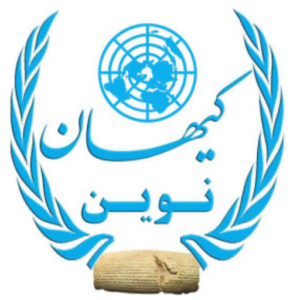تنها چند روز پس از قتل حکومتی آرمیتا گراوند دختر نوجوانی که در پی حمله آمر به معروف در مترو به کما رفت و پس از ۲۸ روز چشم از جهان فرو بست، یک نماینده مجلس شورای اسلامی معتقد است طرح «حجاب و عفاف» یک قانون «روان و راحت» است. او درباره برخورد با زنانی با پوشش اختیاری هم گفته که هرکس خربزه میخورد پای لرزش هم بنشیند. در آنسو رئیس قوه قضاییه نیز تأکید کرده که برای «برخورد با هنجارشکنان» نباید منتظر تصویب لایحه «حجاب و عفاف» ماند!
Just a few days after the government murder of Armita Gravand, a teenage girl who fell into a coma after being attacked by Amer Maarouf in the subway and died after 28 days, a member of the Islamic Council believes that the Hijab and Chastity plan is a law. It is smooth and comfortable. He also said about dealing with women with optional clothing that anyone who eats a melon should tremble. On the other hand, the head of the Judiciary has also emphasized that one should not wait for the approval of the “Hijab and Chastity” bill to “deal with norm breakers”!
کیهان نوین: مجتبی ذوالنوری: هرکسی خربزه میخورد باید پای لرزش هم بنشیند. کسی که تخلف میکند جریمه آن را نیز میدهد.
هرچند هنوز لایحه «حجاب و عفاف» قانونی نشده اما اکثر بخشهای آن در سطح جامعه و در نهادها و سازمانهای مختلف در حال اجرا است.
غلامحسین محسنی اژهای رئیس قوه قضاییه نیز سه روز پیش به دادستانها تأکید کرده که برای «برخورد با هنجارشکنان» منتظر لایحه «حجاب و عفاف» نمانند!
مجتبی ذوالنوری نماینده مجلس شورای اسلامی معتقد است که «قانون عفاف و حجاب قانون سختی نیست که جامعه نتواند آن را بپذیرد. قانون روان و راحتی است و به آن سفت و سختی که برخی دوستان گفتند نیست و قابل اجرا است.»
یکی از انتقادهایی که به لایحه «حجاب و عفاف» میشود مربوط به جریمههای نقدی گسترده در این لایحه و به بهانه «بیحجابی» است. جریمههایی که یک عده معتقدند هدف آن درآمدزایی برای دولت بوده و برخی دیگر از موافقانِ مبارزه با بیحجابی نیز معتقدند که اساساٌ نمیتواند اثری بر رعایت حجاب اجباری از سوی زنانی باشد که پوشش اختیاری دارند. شماری دیگر نیز ارقام جریمهها را غیرعقلانی و بالا ارزیابی میکنند و به آن انتقاد دارند.
مجتبی ذوالنوری اما گفته «هرکسی خربزه میخورد باید پای لرزش هم بنشیند. کسی که تخلف میکند جریمه آن را نیز میدهد.»
لایحه «حجاب و عفاف» اواخر سال گذشته از سوی قوه قضاییه تدوین و اوایل امسال به دولت ارائه شد. این طرح به سرعت درهیئت دولت تصویب و برای بررسی به مجلس شورای اسلامی رفت. در مجلس شورای اسلامی نیز کمیسیون قضایی و حقوقی مسئول رسیدگی به این لایحه شد اما اعضای این کمیسیون پیشنهاد رفتن لایحه زیر اصل ۸۵ قانون اساسی را دادند.
بر اساس اصل ۸۵ قانون اساسی، مجلس شورای اسلامی میتواند در موارد ضروری صلاحیت وضع قوانین آزمایشی را به کمیسیونهای خویش تفویض کند که در اینصورت بررسی و تصویب قانون به دور از چشم افکار عمومی انجام میشود.
لایحه حجاب و عفاف در نهایت اواخر خردادماه امسال به شورای نگهبان رفت اما این شورا پس از تقریبا دو ماه ایرادهایی به لایحه وارد و آن را برای اصلاح به مجلس شورای اسلامی بازگرداند.
مهمترین ایرادهای شورای نگهبان به این لایحه، روشن نبودن مرزهای ضوابط مصوبه در برخی موارد، عدم تعریف برخی تعابیر و اصطلاحات تفسیربردار، ابهام در نسبت برخی از احکام مصوبه با مصوبات شورای عالی انقلاب فرهنگی و مغایرت برخی مواد با اصل ۷۵ قانون اساسی به جهت افزایش هزینههای عمومی یا کاهش درآمدهای عمومی بدون پیشبینی طریق تامین یا جبران آن، اعلام شده است.
بر اساس توضیحات ارائه شده در وبسایت شورای نگهبان، «مواد متعددی از این مصوبه، برای ترویج، تبلیغ و یا ارتکاب «بیعفتی» احکام و ضمانت اجراهای مختلفی تعیین شده است، لکن تعریفی از این عبارت نه در مصوبه و نه در دیگر قوانین موضوعه وجود ندارد. بر همین اساس با توجه به اینکه منظور از «بیعفتی» روشن نبوده و مشخص نیست چه رفتارهایی را در برمیگیرد، دامنه و حدود آن با ابهام مواجه شد.»
شورای نگهبان در بخشی دیگر از ایرادات به این لایحه آورده که در ماده (۶) مقرر شده است که اقلام مرتبط با عفاف و حجاب و ملزومات آن به عنوان «کالای فرهنگی» محسوب شده و از مزایای آن بهرهمند خواهند شد اما با توجه به اینکه این اصطلاح در قوانین تعریف مشخصی ندارد، آثار و احکام محسوب شدن اقلام مرتبط با عفاف و حجاب به عنوان «کالای فرهنگی» روشن نیست؛ از اینرو منظور از این اصطلاح و آثار مترتب بر آن واجد ابهام شناخته شد.
مجتبی ذوالنوری اما معتقد است ایراداتی که شورای نگهبان و هیات نظارت به لایحه گرفته اند اصلی نیستند که ماهیت آن را بتواند تغییر بدهد. ایراداتی است که حتی اگر حذف هم شوند تغییر آنچنانی در ماهیت لایحه اتفاق نمیافتد.
بر اساس اعلام ذوالنوری، مجلس شورای اسلامی دو هفته برای رفع ایرادات لایحه فرصت دارد. او ابراز امیدواری کرده که حداکثر پس از دو ماه این لایحه با تصویب در شورای نگهبان به قانون تبدیل شود.
هر چند هنوز لایحه «حجاب و عفاف» قانونی نشده اما اکثر بخشها کلی آن در سطح جامعه و در نهادها و سازمانهای مختلف در حال اجرا است. اواخر شهریور امسال نمایندگان مجلس شورای اسلامی پیشتر به اجرای آزمایشی آن به مدت سه سال رأی مثبت دادند.
غلامحسین محسنی اژهای رئیس قوه قضاییه نیز سه روز پیش به دادستانها تأکید کرده که برای «برخورد با هنجارشکنان» منتظر لایحه «حجاب و عفاف» نمانند!
رئیس قوه قضاییه گفته که «دادستانها و مقامات ذیصلاح قضایی مقوله اجرای قانون در بحث مقابله با ناهنجاریهای اجتماعی را از فراجا مطالبه کنند و فراجا و وزارت کشور نیز در این عرصه به میدان بیایند؛ نباید منتظر تصویب لایحه مرتبط با عفاف و حجاب ماند.»
غلامحسین محسنی اژهای همچنین خواستار برخورد قانونی با کسانی شد که «ناهنجاریها را ترویج میدهند» و افزود این افراد «در زمین دشمن بازی میکنند.»
این سخنان محسنی اژهای تنها سه روز پس از جانباختن آرمیتا گراوند دختر نوجوانی مطرح شده که به دلیل ضرب و جرح مأموران امر به معروف در مترو به کما رفته بود.
روزنامه «اعتماد» ۲۹ امرداد در گزارشی جزئیات و پیشنهادات مطرح در لایحه حجاب را منتشر کرد؛ از جمله آنکه «مجازاتهای این قانون نسبت به دختران دارای ۹ سال تمام قمری و پسران با ۱۵ سال تمام قمری اعمال میشود.»
در بخشی از این گزارش آمده بود که «… هر رفتاری که به ترویج برهنگی، بیعفتی، بیحجابی، بدپوششی و اعمال خلاف عفت عمومی از جمله مزاحمت برای نوامیس، پخش کردن محصولات صوتی و چندرسانهای ضد خانواده در اماکن عمومی، ورود آقایان به کلیه مکانهای ویژه بانوان (باشگاهها، ورزشگاه، آرایشگاه، مترو و سایر وسایل نقلیه عمومی، پارکها) و بالعکس، رقص، اختلاط زن و مرد و ابراز یا حمایت از گروههای منحرف جنسی که منجر به برهم زدن آرامش زن و مرد در خانواده، رواج ازدواج دیرهنگام، گسترش طلاق و آسیبهای اجتماعی و زدودن ارزش خانواده میشود، نقض بندهای (۱) و (۷) اصول سوم و دهم قانون اساسی است و مطابق احکام این قانون و سایر قوانین ممنوع میباشد.»
بر اساس این گزارش در ماده ۱۲ این لایحه درباره وظایف وزارت آموزش و پرورش شنیده شده پیشنهادی مطرح بوده که در پایان این بند، «همچنین استفاده از چادر به عنوان حجاب برتر برای کلیه دانشجو، معلمین و بانوان شاغل در آموزش و پرورش اعم از اداری و آموزشی الزامی و کاشت ناخن و مژه برای آنان ممنوع میباشد» اضافه شود!
این گزارش «طبق شنیدهها» نوشته که پیشنهاد شده بندی به ماده ۱۲ اضافه شود به این شرح: «وزارت آموزش و پرورش به منظور گسترش فرهنگ عفاف و حجاب و خانواده اسلامی موظف است با همکاری مدیریت حوزههای علمیه طرح به کار گرفتن طلاب (خواهر و برادر) در تمام مدارس کشور (طرح امین) را پس از تصویب هیات وزیران به جهت تصویب به مجلس شورای اسلامی ارائه نماید.»
همچنین شنیده شده پیشنهادی نیز برای الحاق بند دیگری به این ماده ارائه شده بود که طبق آن، کاشت ناخن ممنوع خواهد شد: «ایجاد ساز و کار لازم به منظور نظارت بر کار آرایشگران بانوان و اعمال ممنوعیت در کاشت ناخن و مژه.»
در این گزارش با اشاره به ماده ۳۲ که سازمان بسیج را مخاطب قرار داده آمده است:« شنیده شده برای این ماده نیز پیشنهادی مطرح بوده که در بند یک، موضوع اعطای مجوز شوکر و اسپری به بسیجیان؛ طبق این پیشنهاد پس از «آموزش عمومی امر به معروف و نهی از منکر لسانی»، «اعطای مجوز شناسایی و سامانه ثبت تخلفات و تجهیزات دفاع شخصی مانند شوکر و افشانه» به بسیجیان اضافه شود.»
ممنوعیت سگگردانی، ممنوعیت فیلمبرداری و تصویربرداری از آمران به معروف، استفاده از گزارش لباسشخصیها و بسیجیان به عنوان «مستندات» در دادگاه، از دیگر موارد پیشنهاد شده در این لایحه است.
New Universe:
Mojtaba Zulnoori: Anyone who eats melons should also sit on the feet of trembling. The one who violates will also pay the fine.
Although the “Hijab and Chastity” bill has not yet been enacted, most of its parts are being implemented at the community level and in various institutions and organizations.
Gholamhossein Mohseni Ajei, the head of the judicial branch, also stressed to the prosecutors three days ago that they should not wait for the “Hijab and Chastity” bill to “deal with norm breakers”!
Mojtaba Zulnouri, a member of the Islamic Council, believes that “the law of chastity and hijab is not a hard law that the society cannot accept.” The law is flexible and easy, and not as rigid as some friends said, and it can be implemented.”
One of the criticisms of the “Hijab and Chastity” bill is related to the extensive fines in this bill and the excuse of “non-hijab”. Some people believe that the purpose of the fines is to generate income for the government, and some other supporters of the fight against veiling also believe that it basically cannot have an effect on the observance of the mandatory hijab by women who wear optional veils. Some others consider the figures of fines irrational and high and criticize them.
But Mojtabi Zulnouri said, “Anyone who eats melons should also sit on the feet of trembling.” “Whoever commits a violation will also pay the fine.”
The “Hijab and Chastity” bill was drafted by the judiciary late last year and submitted to the government early this year. This plan was quickly approved by the government committee and went to the Islamic Council for review. In the Islamic Council, the judicial and legal commission was responsible for handling this bill, but the members of this commission suggested that the bill go under Article 85 of the Constitution.
According to Article 85 of the Constitution, the Islamic Council can, in necessary cases, delegate the authority to enact experimental laws to its commissions, in which case the review and approval of the law will be done away from the eyes of public opinion.
The hijab and chastity bill finally went to the Guardian Council at the end of June this year, but after almost two months, this council raised objections to the bill and sent it back to the Islamic Council for amendment.
The most important objections of the Guardian Council to this bill are the lack of clarity of the boundaries of the approved regulations in some cases, the lack of definition of some interpretations and terms of interpretation, the ambiguity in the relationship of some of the approved provisions with the approvals of the Supreme Council of the Cultural Revolution, and the contradiction of some articles with Article 75 of the Constitution in order to An increase in public expenses or a decrease in public revenues has been announced without providing or compensating for it.
According to the explanations provided on the website of the Guardian Council, “many articles of this resolution have been determined to promote, advertise or commit “immorality” and guarantee various executions, but a definition of this phrase is neither in the resolution nor in other relevant laws. Does not exist. Accordingly, due to the fact that the meaning of “immorality” is not clear and it is not clear what behaviors it includes, its scope and limits were ambiguous.
In another part, the Guardian Council raised objections to this bill, which states in Article (6) that items related to chastity and hijab and its necessities are considered as “cultural goods” and will benefit from its benefits, but considering that This term does not have a specific definition in the laws, the works and rulings regarding items related to chastity and hijab as “cultural goods” are not clear; Therefore, the meaning of this term and its related works were considered ambiguous.
However, Mojtaba Zulnoori believes that the objections raised by the Guardian Council and the Supervisory Board are not the main ones that can change its nature. There are flaws that even if they are removed, there is not much change in the nature of the bill.
According to Zulnouri’s announcement, the Islamic Council has two weeks to fix the flaws in the bill. He expressed his hope that after two months at the latest, this bill will become a law with the approval of the Guardian Council.
Although the “Hijab and Chastity” bill has not been legalized yet, most of its general parts are being implemented at the community level and in various institutions and organizations. At the end of September this year, the representatives of the Islamic Council previously voted in favor of its trial implementation for three years.
Gholamhossein Mohseni Ajei, the head of the Judiciary, also stressed to the prosecutors three days ago that they should not wait for the “Hijab and Chastity” bill to “deal with norm breakers”!
The head of the judiciary said that “prosecutors and competent judicial authorities should demand from Faraja the category of law enforcement in dealing with social anomalies, and Faraja and the Ministry of Interior should also come to the fore in this field; We should not wait for the approval of the bill related to chastity and hijab.”
Gholamhossein Mohseni Ajeei also called for legal action against those who “promote anomalies” and added that these people “are playing in the enemy’s field.”
These words of Mohseni Ajei came only three days after the death of Armita Gravand, a teenage girl who was in a coma due to the beating of Amr Be Maruf officers in the subway.
“Etimad” newspaper on 29 Amrdad published the details and suggestions of the hijab bill in a report; including that “the punishments of this law are applied to girls with 9 full lunar years and boys with 15 full lunar years.”
In a part of this report, it was stated that “… any behavior that promotes nudity, indecency, lack of veiling, bad clothing and acts against public modesty, including harassment of nawamis, broadcasting anti-family audio and multimedia products in public places, entry of men into all places Especially for women (clubs, gyms, hairdressers, subway and other public transportation, parks) and vice versa, dancing, mixing men and women and expressing or supporting sexually deviant groups that lead to disturbing the peace of men and women in the family, the prevalence of late marriage It is a violation of clauses (1) and (7) of the third and tenth principles of the constitution and is prohibited according to the provisions of this law and other laws.
According to this report, in Article 12 of this bill about the duties of the Ministry of Education, a proposal was made that at the end of this paragraph, “Also, the use of chador as a superior hijab for all students, teachers and women working in education, including administrative And mandatory education and nail and eyelash planting are prohibited for them” to be added!
This report “According to what we have heard” writes that it is proposed to add a clause to Article 12 as follows: “In order to spread the culture of chastity and hijab and the Islamic family, the Ministry of Education is obliged, in cooperation with the management of seminaries, to plan to employ students (sisters and Brother) in all the country’s schools (Amin’s plan) should be submitted to the Islamic Council for approval after the approval of the Council of Ministers.
It has also been heard that a proposal was submitted to add another clause to this article, according to which nail implants will be prohibited: “Establishing the necessary mechanism to monitor the work of female hairdressers and imposing a ban on nail and eyelash implants.”
In this report, referring to Article 32, which addresses the Basij organization, it is stated: “It has been heard that there was a proposal for this article as well, that in paragraph one, the issue of granting stunner and spray license to the Basijians; According to this proposal, after “public education on what is good and prohibiting bad language”, “granting a license to identify and register violations and personal defense equipment such as shockers and afshaneh” should be added to Basijian.
Prohibition of walking dogs, prohibition of videotaping and taking pictures of Ameran Ba Maruf, using the report of personal clothing and Basijians as “documents” in the court, are among the other things proposed in this bill.













